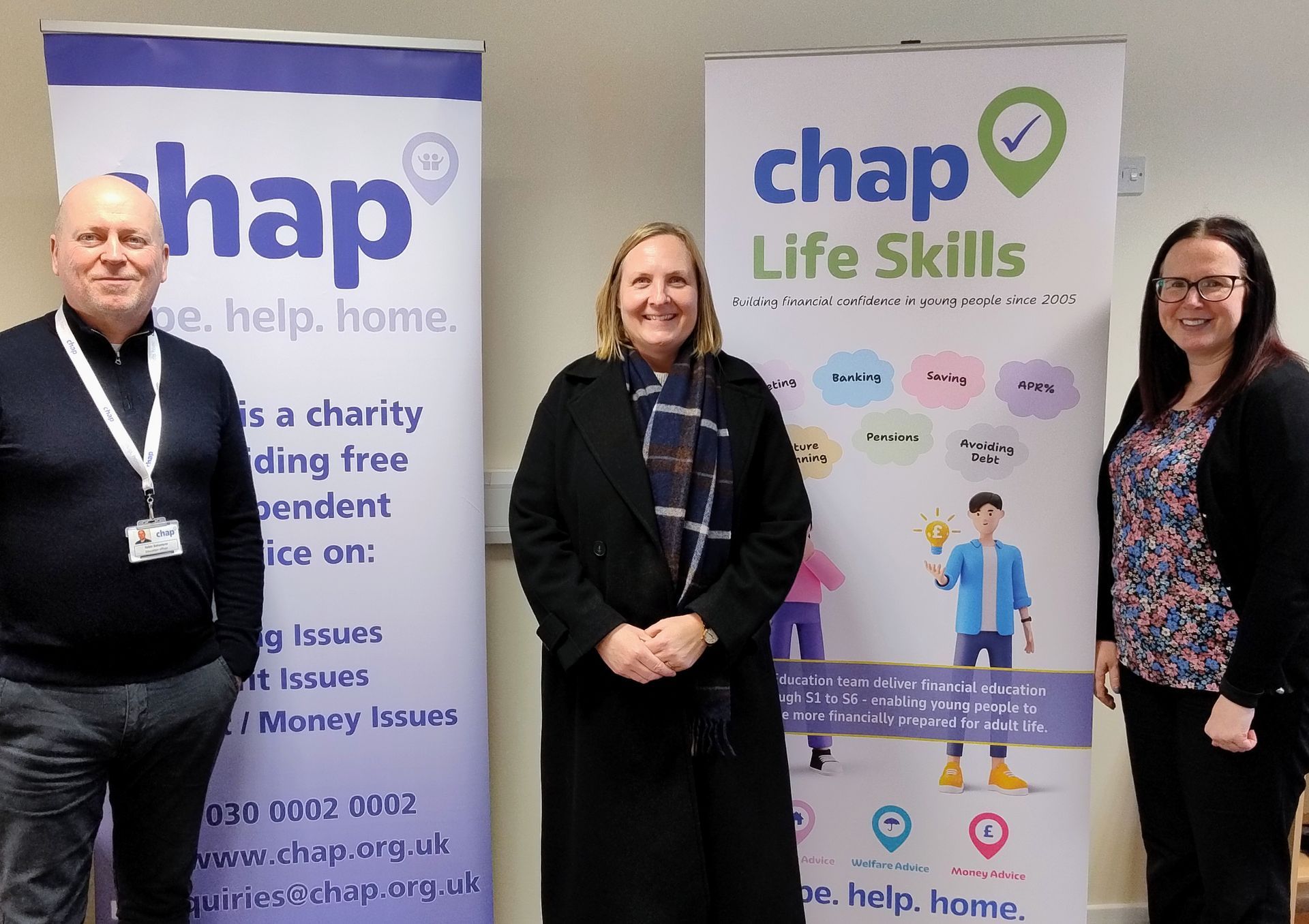We are here to help,
tell us what you need...

Worried about mortgage payments?
The AHAP service provides free financial advice and legal support for homeowners in Ayrshire who are experiencing financial difficulties and are unable to maintain their mortgage payments.
AHAP is a partnership between CHAP and Govan Law Centre and is funded by the Scottish Legal Aid Board.
REFERRALS
To make an appointment with an adviser, or to refer someone, please select the relevant link below.
DONATIONS
What our clients said
Latest News...

2025 has been another extremely busy year for the team at CHAP, with demand for our services continuing to rise. Over the past year, 2,055 individuals were referred to us for support, highlighting just how vital our services remain within the communities we serve. Alongside this increased demand, the outcomes we have achieved for our clients have reached a record high. In 2025, we secured more than £4.27 million for the people we support - an increase of £1 million compared to our achievements in 2024. This vital income has made a real and lasting difference to the lives of many individuals and families. While the financial impact is significant, the support we provide goes far beyond money alone. Many clients told us that accessing CHAP’s services helped to reduce their stress levels, with 68% reporting a noticeable improvement. Others shared how our support positively influenced their confidence, health, education and employment prospects, as well as helping them to build stronger social connections and enjoy a better overall quality of life.

CHAP is very pleased to announce an exciting partnership with Morgan Sindall Construction that aims to equip secondary school pupils with the financial skills needed to prepare them for life beyond the classroom and into adulthood. Established in 2005, CHAP’s education department has long played a vital role in raising awareness of the realities of homelessness, challenging stereotypes, and highlighting the responsibilities and costs related to independent living to S4 pupils across North Ayrshire. In 2015, this work expanded to include financial education workshops, supporting young people to better understand budgeting, credit rating, saving, and wider money management. Thanks to funding from The Robertson Trust, another milestone was reached earlier in 2025 by extending Life Skills and financial education sessions into S1 - S3 classrooms, giving younger pupils the opportunity to develop good financial habits early and strengthen their money confidence. Morgan Sindall Construction delivers a wide range of major construction projects across the UK including primary and secondary schools, colleges and universities. As part of the Morgan Sindall Group, they are committed to making a positive difference within the communities they work in as part of their responsible business plan. One such project is the new Dumfries High School that is currently under construction and scheduled to open in late Spring 2026. To complement and support their investment in apprenticeships and the young workforce, Morgan Sindall Construction has funded CHAP to engage with pupils at the existing Dumfries High School, St Joseph’s College, North West Community Campus, and Dumfries Academy to deliver a comprehensive programme of financial literacy sessions. These interactive sessions cover essential money skills including budgeting, saving, understanding credit, and the real-life cost of everyday living. Feedback from both staff and pupils has been extremely positive, with CHAP already seeing strong engagement and enthusiasm from the young people taking part. Robin Ballantyne, Senior Education Officer at CHAP, said: “We’re delighted to be working alongside Morgan Sindall Construction on this important initiative. Giving young people the tools and confidence to manage their money is vital, particularly as they prepare for life beyond school. This partnership allows us to reach new communities and build long-term impact while Morgan Sindall delivers transformational educational facilities across the region.” Elizabeth Halliday, Head of Responsible Business (Scotland) at Morgan Sindall Construction said: “Creating long-term value for communities goes hand in hand with the schools we build. Partnering with CHAP helps us strengthen our social value commitments by offering young people meaningful skills that will support them into adulthood and the workplace.” This partnership reflects a shared ambition to improve outcomes for people living in the communities served by both parties. By working together, CHAP and Morgan Sindall Construction are laying the foundations for long-term support for young people to gain confidence in their financial and everyday life skills. For more information about Morgan Sindall Construction, please visit: www.morgansindallconstruction.com

November 27th marked a proud and memorable milestone for CHAP as we celebrated our 25th anniversary with a special event at the Scottish Parliament. Our event, entitled 'Transforming Lives - resilience & equity for all', was hosted at Holyrood and provided a unique opportunity to celebrate and reflect on a quarter-century of providing free, independent advice and support to individuals and families in need across Ayrshire. The event brought together partners, funders, MSPs, staff and trustees, creating valuable space for meaningful conversations about the ongoing challenges faced by those experiencing housing, debt and financial insecurity. Throughout the afternoon, guests took the time to speak with our team, learn more about our services and share ideas on how we can continue working together to support communities and prevent people from reaching crisis point. The event was sponsored by Kenneth Gibson MSP, whose ongoing support for CHAP has been invaluable. Kenneth welcomed guests and helped create an open, positive atmosphere that encouraged discussion and connection, reinforcing the importance of partnership working in addressing complex social issues affecting our communities. We were delighted to be joined by Màiri McAllan MSP, Cabinet Secretary for Housing, who kindly said a few words recognising CHAP’s achievements, professionalism and the breadth of services we provide. Her comments highlighted the importance of early intervention and acknowledged how closely our work aligns with the Scottish Government’s priorities to tackle the housing crisis, reduce poverty and improve outcomes for families across Scotland. Hearing this recognition at a national level was both encouraging and affirming for our team. We would like to extend our sincere thanks to Kenneth Gibson MSP and Màiri McAllan MSP, as well as all our partners and funders who took the time to join us and celebrate this important milestone. Your engagement, support and shared commitment to help tackle inequality and financial exclusion mean a great deal to our charity. We are also extremely grateful to the businesses who generously sponsored key elements of the event: TES-AMM (Europe) Ltd for the catering, Branding Hub Ayr for providing printed materials, and Stagecoach West Scotland for supplying a complimentary coach and driver to transport our staff and guests from Ardrossan to Edinburgh and back safely and in comfort. The event was a privilege and a real highlight in CHAP’s 25-year history and a reminder of the strength of the partnerships that make our work possible. As we look ahead, we remain committed to growing, adapting, and continuing to support as many individuals and families as we can - and we look forward to the next exciting chapter of our journey. A video of highlights from the event can be viewed on our YouTube channel here .





